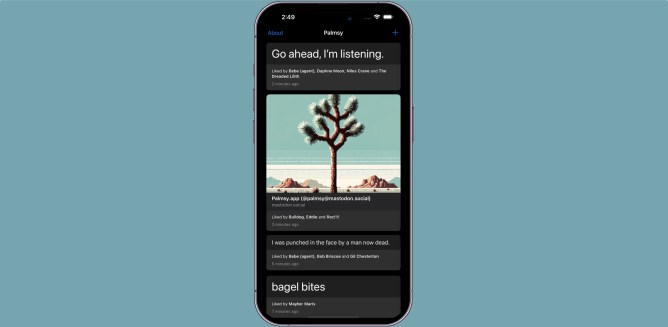
Meet Palmsy, a Fake Social Network Where Your Posts Stay Forever on Your Device
When you sign up to a new social network, you have zero friends, zero followers, and zero likes. But as you start posting content, you might get more and more likes and comments. This could lead to new followers, and that dopamine boost will encourage you to post even more. However, the constant pursuit of validation can be detrimental to our mental health.
A new app called Palmsy is trying to act as social media methadone by letting you post anything and getting likes on them. But the catch is that no one can see the posts. You can publish as many posts as you like, even adding photos to your posts, but you’re sending those posts into the void.
How Palmsy Works
The free app — which works on both iPhone and iPad — essentially reads your contact list to assign pretend likes to posts. While the app is reading your contact details, because all posts are local, contact information is not sent to a server. The developer, Pat Nakajima, said in an interview that no post leaves your device and all likes are fake.
"It can be fun to see Likes coming in from folks you haven’t thought about in years," Nakajima writes in the FAQ section of the app. "It can also be useful in maybe deleting some contacts you might not need anymore."
Palmsy shows you the contact who ‘liked’ your post, giving you a sense of validation without the actual social interaction.
Using Palmsy as a Personal Diary or Pun Station
Beyond looking at contacts, you can treat the app as a personal diary or even a place to get bad puns out of your system — nobody is going to judge you. It’s up to you.
The developer recently updated the app with some advanced options that let you limit the number of likes on a particular post and for how long you want those likes to come in: a few seconds, a few minutes, a few hours or a few days.
A History of Time-Limiting Apps
There have been multiple time-limiting apps that try to help when it comes to reducing social media addiction. Some developers have also released very basic apps to post dumb posts without consequences.
In 2017, developer Dan Kurtz released Binky, which generated a fake feed for you to interact with. In 2018, former Google Reader product manager Jason Shellen relaunched Brizzly as a website, which lets you put anything in a text box and hit send. The posts go nowhere, and you can’t even see them once you hit send.
The Benefits of Palmsy
While Palmsy may not be the most innovative app, it does offer some benefits for those struggling with social media addiction. By providing a sense of validation without the actual social interaction, Palmsy can help users feel more confident in their online interactions.
Additionally, the app’s ability to limit likes and comments can be useful for those who want to take control of their social media use. By setting boundaries on when and how often you receive likes and comments, you can create a healthier relationship with social media.
Conclusion
Palmsy is an interesting experiment in the world of social media. While it may not be the most effective solution for reducing social media addiction, it does offer some benefits for those struggling with validation and control over their online interactions. By providing a sense of validation without the actual social interaction, Palmsy can help users feel more confident in their online interactions.
However, as with any app, there are potential drawbacks to consider. The constant pursuit of validation can be detrimental to our mental health, and relying on fake likes and comments may not address the underlying issues.
Ultimately, whether or not Palmsy is effective in reducing social media addiction depends on individual circumstances. But for those struggling with online validation, Palmsy is worth considering as a tool to help manage their social media use.
Related Articles
- What will this year bring in VC? We asked a few investors
- Apple TV+ is free to stream this weekend
- Ecosia and Qwant, two European search engines, join forces on an index to shrink reliance on Big Tech
Sources
- Pat Nakajima’s interview with Threads
- Palmsy FAQ section
- Ivan Mehta’s article on TechCrunch


